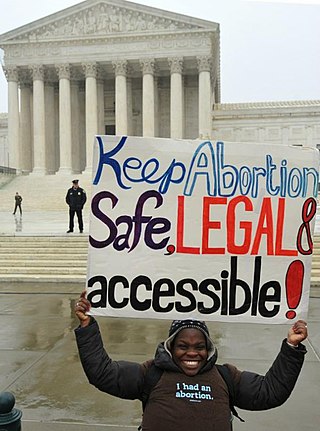Related Research Articles

Teenage pregnancy, also known as adolescent pregnancy, is pregnancy in a female adolescent or young adult under the age of 20.

Family planning is the consideration of the number of children a person wishes to have, including the choice to have no children, and the age at which they wish to have them. Things that may play a role on family planning decisions include marital situation, career or work considerations, financial situations. If sexually active, family planning may involve the use of contraception and other techniques to control the timing of reproduction.
Reproductive rights are legal rights and freedoms relating to reproduction and reproductive health that vary amongst countries around the world. The World Health Organization defines reproductive rights as follows:
Reproductive rights rest on the recognition of the basic right of all couples and individuals to decide freely and responsibly the number, spacing and timing of their children and to have the information and means to do so, and the right to attain the highest standard of sexual and reproductive health. They also include the right of all to make decisions concerning reproduction free of discrimination, coercion and violence.

Sexual and reproductive health (SRH) is a field of research, health care, and social activism that explores the health of an individual's reproductive system and sexual well-being during all stages of their life. Sexual and reproductive health is more commonly defined as sexual and reproductive health and rights, to encompass individual agency to make choices about their sexual and reproductive lives.
Abortion in the Czech Republic is legally allowed up to 12 weeks of pregnancy, with medical indications up to 24 weeks of pregnancy, in case of grave problems with the fetus at any time. Those performed for medical indications are covered by public health insurance, but otherwise, abortion is relatively affordable in the Czech Republic. In Czech, induced abortion is referred to as interrupce or umělé přerušení těhotenství, often colloquially potrat ("miscarriage").
Abortion in Iran, as can be expected of many government policies, changed drastically between governments.
Abortion is illegal in El Salvador. The law formerly permitted an abortion to be performed under some limited circumstances, but in 1998 all exceptions were removed when a new abortion law went into effect.

Reproductive justice is a critical feminist framework that was invented as a response to United States reproductive politics. The three core values of reproductive justice are the right to have a child, the right to not have a child, and the right to parent a child or children in safe and healthy environments. The framework moves women's reproductive rights past a legal and political debate to incorporate the economic, social, and health factors that impact women's reproductive choices and decision-making ability.

Family planning in India is based on efforts largely sponsored by the Indian government. From 1965 to 2009, contraceptive usage has more than tripled and the fertility rate has more than halved, but the national fertility rate in absolute numbers remains high, causing concern for long-term population growth. India adds up to 1,000,000 people to its population every 20 days. Extensive family planning has become a priority in an effort to curb the projected population of two billion by the end of the twenty-first century.

Even though there is considerable demand for family planning in Pakistan, the adoption of family planning has been hampered by government neglect, lack of services and misconceptions. Demographics play a large role in Pakistan's development and security since the change from military rule to civilian leadership. Challenges to Pakistani's well-being, opportunities for education and employment, and access to health care are escalated due to the country's continuously-growing population. It was estimated in 2005 that Pakistan's population totaled 151 million; a number which grows 1.9 percent annually, equaling a 2.9 million population growth per year. Though Pakistan's fertility rates still exceed those of neighboring South Asian countries with a total fertility rate at 4.1 and contraception use is lower than 35 percent, approximately one-fourth of Pakistani women wish to either delay the birth of their next child or end childbearing altogether.
Reproductive coercion is a collection of behaviors that interfere with decision-making related to reproductive health. These behaviors are meant to maintain power and control related to reproductive health by a current, former, or hopeful intimate or romantic partner, but they can also be perpetrated by parents or in-laws. Coercive behaviors infringe on individuals' reproductive rights and reduce their reproductive autonomy.

Abortion in Moldova is legal on request within the first 12 weeks of pregnancy, and generally permitted until 28 weeks for a broad variety of reasons determined by the Ministry of Health. The Ministry of Health orders permit abortions until 22 weeks in the event of a threat to health, a pregnancy that results from a crime, a fetus with genetic defects or for social reasons, and abortions are permitted until 28 weeks if the fetus has severe malformations or congenital syphilis. Abortions must be carried out in authorized medical facilities by obstetricians and gynecologists.
Abortion is illegal in Bangladesh under most situations, but menstrual regulation is often used as a substitute. Bangladesh is still governed by the penal code from 1860, where induced abortion is illegal unless the woman is in danger.
Abortion in Kazakhstan is legal as an elective procedure up to 12 weeks, and special circumstances afterwards. The relevant legislation is based on the laws inherited from the country's Soviet past, when abortion was legally permitted as a contraceptive.
Abortion in Cambodia is legal upon request within the first twelve weeks of pregnancy.
Abortion in Georgia is legal on request within the first 12 weeks of pregnancy. Between 12 and 22 weeks, abortions may be performed on medical grounds under conditions established by the Ministry of Health, Labour and Social Affairs. After 22 weeks, abortions additionally require approval of a three-member medical committee. The law governing abortion was instituted in 2000.
Abortion in Egypt is prohibited by Articles 260–264 of the Penal Code of 1937. However, under Article 61 of the Penal Code, exceptions may be granted in cases of necessity, which has typically been interpreted to permit an abortion necessary to save the life of the pregnant woman. In some cases, this exception has been extended to cases where the pregnancy poses dangers to the pregnant woman's health, and to cases of foetal impairment. A physician can only perform an abortion in such cases when two specialists approve, unless the woman's life is in imminent danger.

Abortion in Kenya is prohibited with the exception of certain circumstances including danger to the life and health of the expectant mother, and rape. Unsafe abortions are a major cause of deaths and health complications for women in Kenya.

The status of women in Zambia has improved in recent years. Among other things, the maternal mortality rate has dropped and the National Assembly of Zambia has enacted multiple policies aimed at decreasing violence against women. However, progress is still needed. Most women have limited access to reproductive healthcare, and the total number of women infected with HIV in the country continues to rise. Moreover, violence against women in Zambia remains common. Child marriage rates in Zambia are some of the highest in the world, and women continue to experience high levels of physical and sexual violence.
In 2005, the Ethiopian Parliament liberalised the abortion law to grant safe abortions to women in specific circumstances.
References
- ↑ Division, United Nations Dept of Economic and Social Affairs Population; population, Nations Unies Division de la (2001). Abortion Policies: A Global Review. United Nations Publications. ISBN 9789211513653.
- 1 2 3 4 Hollander, D. (2005-09-08). "Although Abortion Is Highly Restricted in Cameroon, It Is Not Uncommon Among Young Urban Women". International Perspectives on Sexual and Reproductive Health. 29 (1): 49–50. doi:10.2307/3181002. JSTOR 3181002 . Retrieved 2016-06-21.
- 1 2 Calvès, Anne-Emmanuèle (2002). "Abortion Risk and Decisionmaking among Young People in Urban Cameroon". Studies in Family Planning. 33 (3): 249–260. doi:10.1111/j.1728-4465.2002.00249.x. JSTOR 3181117. PMID 12385086.
- 1 2 3 "Women's Reproductive Rights in Cameroon: A Shadow Report" (PDF). Center for Reproductive Law and Policy. 1999. Retrieved 21 June 2016.
